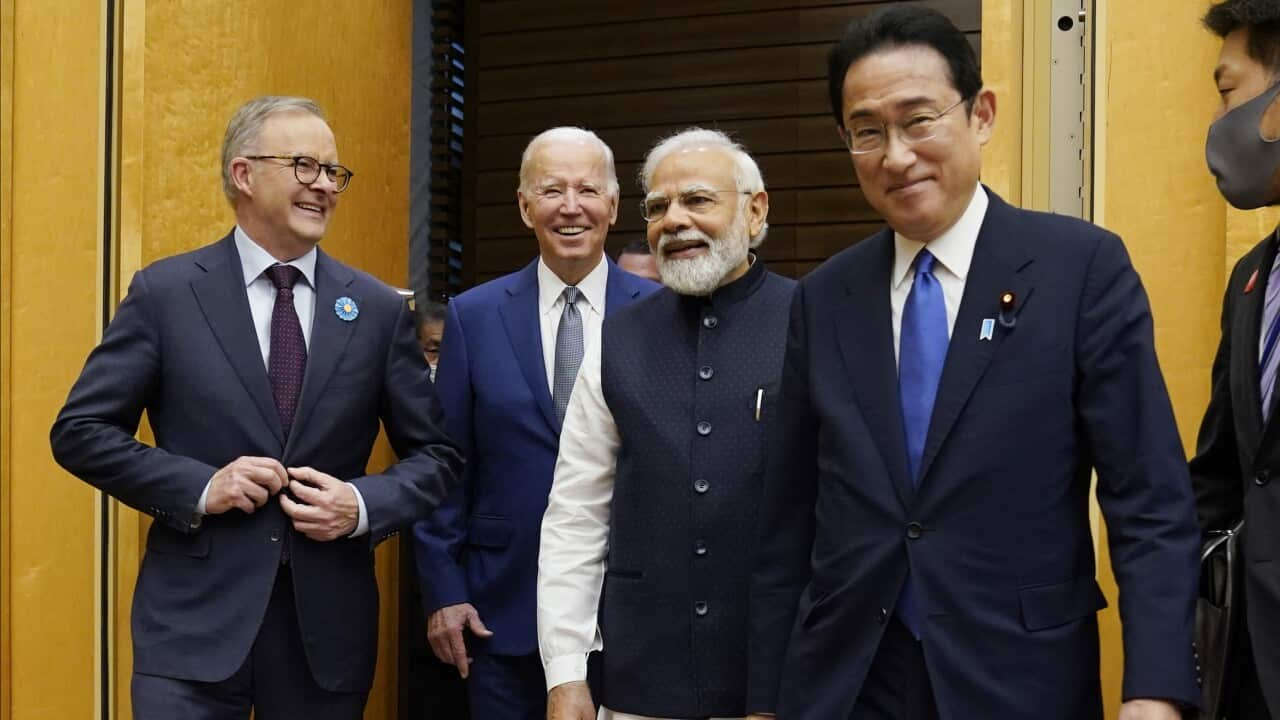Key Points
- United States President Joe Biden has cancelled a visit to Australia scheduled for next week.
- President Biden was set to travel in the middle of high-stakes negotiations on the US debt ceiling.
- It would have been the first visit by a US president to Australia in almost a decade.
Prime Minister Anthony Albanese has announced the Quad leaders' summit will not be going ahead in Sydney after United States President Joe Biden cancelled his planned visit.
The leaders of Australia, the US, Japan, and India were scheduled to meet in Sydney on 24 May for the meeting, with Mr Biden also due to address federal parliament the day before.
But the US president has called off his visit due to negotiations with the US Congress about raising the debt ceiling to avoid an economically catastrophic default, with the deadline looming at the end of the month.
Mr Albanese said Mr Biden's visit to Australia would be postponed, and that he had been invited by the president to the US for a state visit later in the year.
What will happen with the Quad meeting now?
In a statement issued by the US Embassy in Australia, White House Press Secretary Karine Jean Pierre said Mr Biden would return to the US on Sunday, following the completion of the G7 summit.
"The President spoke to Prime Minister Albanese earlier today to inform him that he will be postponing his trip to Australia," Ms Jean-Pierre said.
"He also invited the Prime Minister for an official state visit at a time to be agreed by the teams."
It would have been the first visit by a US president to Australia in almost a decade and the fifth time a US president had addressed MPs and senators.
Mr Albanese said the four leaders were attempting to get together in Japan on the sidelines of the G7 summit, which he would be attending as a guest.
"At this stage, we haven't got a time locked in for that arrangement," he told reporters on Wednesday.
"This is a decision that's been made overnight, our time, in the United States.
"The Quad leaders meeting will not be going ahead in Sydney next week."

President Joe Biden called off his visit due to negotiations with the US Congress about raising the debt ceiling to avoid an economically catastrophic default. Source: AAP / USA TODAY Network/Sipa USA
Mr Albanese said the cancellation of Mr Biden's visit did not downplay the significance of the Quad.
"President Biden emphasised the importance of the Quad. He was very disappointed at some of the actions, obviously, of some members of Congress and in the US Senate," he said.
"Obviously, the domestic priority for the president, understandably, is to play a role in resolving those issues."
Opposition Leader Peter Dutton said the president's cancellation was disappointing but understandable.
"There are domestic issues that the president has to attend to, and he'd be a welcome guest into our country at any time," he told Sky News on Wednesday.
"This was going to be an opportunity on a bipartisan basis to welcome him to our country. The AUKUS arrangement is historic."
What is going on with the US debt ceiling?
President Biden was set to travel in the middle of high-stakes negotiations on the US debt ceiling.
The wrangling in Washington between the White House and Congress Republicans revolves around a deal to raise the US government's $US31.4 trillion ($A46.9 trillion) debt ceiling and avert an economically catastrophic default.
The US debt ceiling is set to expire on 1 June, with the Treasury Department warning the US government will be unable to pay its bills beyond that date unless the White House and Congress agree to raise it.
Annual debt ceiling negotiations have routinely been a game of chicken, used by both parties to extract concessions before striking a deal, often at the eleventh hour.
The US has never defaulted on its debt.
"The President has made clear that members of Congress from both parties and chambers must come together to prevent default, as they have 78 times before," Ms Jean-Pierre said.
"The President and his team will continue to work with Congressional leadership to deliver a budget agreement that can reach the President’s desk."
In a 2021 report, the White House Council of Economic Advisors was stark on the possible impacts of that changing: a global recession, frozen credit markets across the world, decimated stock markets, and mass unemployment globally.
And rhetoric has been escalating recently, with former president and front-runner for the 2024 Republican nomination, Donald Trump, appearing to endorse the prospect of a default.
“I say to the Republicans out there: if they don’t give you massive cuts, you’re going to have to do a default,” he said last week.
"I think the Democrats will absolutely cave, will absolutely cave because you don’t want to have that happen. But it’s better than what we’re doing right now, because we’re spending money like drunken sailors.”









